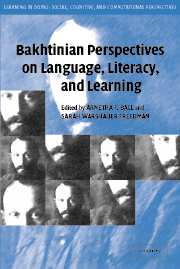Book contents
- Frontmatter
- Contents
- List of Contributors
- Acknowledgments
- PART I IDEOLOGIES IN DIALOGUE: THEORETICAL CONSIDERATIONS
- PART II VOICED, DOUBLE VOICED, AND MULTIVOICED DISCOURSES IN OUR SCHOOLS
- PART III HETEROGLOSSIA IN A CHANGING WORLD
- 9 New Teachers for New Times: The Dialogical Principle in Teaching and Learning Electronically
- 10 Is Contradiction Contrary?
- 11 A Bakhtinian Perspective on Learning to Read and Write Late in Life
- 12 New Times and New Literacies: Themes for a Changing World
- Voices in Dialogue – Hybridity as Literacy, Literacy as Hybridity: Dialogic Responses to a Heteroglossic World
- PART IV A CLOSING THOUGHT ON BAKHTINIAN PERSPECTIVES
- Author Index
- Subject Index
- Titles in the series
- References
9 - New Teachers for New Times: The Dialogical Principle in Teaching and Learning Electronically
Published online by Cambridge University Press: 24 May 2010
- Frontmatter
- Contents
- List of Contributors
- Acknowledgments
- PART I IDEOLOGIES IN DIALOGUE: THEORETICAL CONSIDERATIONS
- PART II VOICED, DOUBLE VOICED, AND MULTIVOICED DISCOURSES IN OUR SCHOOLS
- PART III HETEROGLOSSIA IN A CHANGING WORLD
- 9 New Teachers for New Times: The Dialogical Principle in Teaching and Learning Electronically
- 10 Is Contradiction Contrary?
- 11 A Bakhtinian Perspective on Learning to Read and Write Late in Life
- 12 New Times and New Literacies: Themes for a Changing World
- Voices in Dialogue – Hybridity as Literacy, Literacy as Hybridity: Dialogic Responses to a Heteroglossic World
- PART IV A CLOSING THOUGHT ON BAKHTINIAN PERSPECTIVES
- Author Index
- Subject Index
- Titles in the series
- References
Summary
INTRODUCTION
Bakhtin's dialogical principle informs and extends our understanding of possibilities for teaching and learning electronically. At the dawn of the twenty-first century, debates over “e-learning” have decidedly shifted from whether it works to how best to take advantage of it. This raises provocative questions about the pedagogical strategies and curriculum designs needed to effectively prepare new teachers for these new times and challenges – particularly in urban, multicultural settings – if schooling itself is not to become obsolete. In this chapter, a web-based, graduate course on urban education for preservice teachers taught by the author in 2001 is used as a “text” for discussion and analysis. Bakhtin's notion of the chronotope as a unit of analysis is extended to a metaphor of the classroom as a chronotopic-like unit (or space) that can provide “X-rays” of important issues in the larger society. It is argued that Bakhtin's ideas about the dialogic, intertextual, heteroglossic nature of meaning-making by human “subjects” prefigure and are highly relevant to the complex issues surrounding teaching and learning generally, as well as electronically.
Techniques and tools for teaching and learning have not changed much in K–12 schooling since its inception in the United States, despite the rapid pace of other societal changes. Yet, the literacy demands of the new century and, consequently, the demands on students after they leave high school are changing radically.
- Type
- Chapter
- Information
- Bakhtinian Perspectives on Language, Literacy, and Learning , pp. 213 - 231Publisher: Cambridge University PressPrint publication year: 2004
References
- 4
- Cited by

